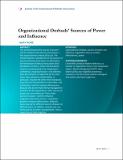| dc.contributor.author | Rowe, Mary | |
| dc.date.accessioned | 2025-06-06T19:48:32Z | |
| dc.date.available | 2025-06-06T19:48:32Z | |
| dc.date.issued | 2024-12 | |
| dc.identifier.uri | https://hdl.handle.net/1721.1/159356 | |
| dc.description.abstract | This article discusses the sources of power—and the influence that derives from power—that organizational ombuds (OO) use. The article presents a standard list of ten sources of power and shows how these are affected by the International Ombuds Association (IOA) Standards of Practice. Under IOA Standards, ombuds are designated to be independent, confidential, impartial/neutral—and informal. Each IOA Standard is supported by the other three. Near-absolute confidentiality, in particular, requires the other three Standards, especially the IOA Standard of informality. And informality is vital for ombuds effectiveness. Because OOs do not make formal management decisions for the organization, other sources of power are much enhanced. These other sources of power—and the influence
engendered by these sources—contribute greatly to ombuds effectiveness. Different cases may call for different sources of power at different times. In addition, ombuds may use many sources of power synergistically—that is, using many of them together. | en_US |
| dc.language.iso | en_US | en_US |
| dc.publisher | Journal of the International Ombuds Association | en_US |
| dc.subject | organizational ombuds, sources of power and influence, negotiation theory, ombuds effectiveness, power | en_US |
| dc.title | Organizational Ombuds' Sources of Power and Influence | en_US |
| dc.type | Article | en_US |
| dc.identifier.citation | Mary Rowe, "Organizational Ombuds' Sources of Power and Influence," Journal of the International Ombuds Association Vol. 16, No 2 (Mary Rowe special issue, 2023-2024). | en_US |
